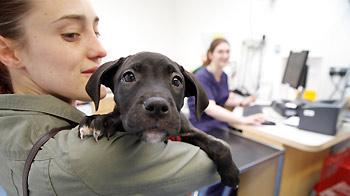How and when we collect information about you - RSPCA
How and when we collect information about you
We may collect personal information from you when you interact with us or with third parties with whom we work. We may also supplement the information we hold about you with information that is available to the public when you visit our website or interact with any of our online content.
When you interact with us
There are many instances when we will collect personal information from you directly. These include, but are not limited to, when you:
- subscribe to our publications or newsletters, request information from us or become involved in one of our campaigns
- use our veterinary services
- volunteer or fundraise for us, or sign up for an RSPCA event
- pledge or make a donation
- adopt or foster an animal from us or sign up for 'Home for Life' registration
- apply for a job with us
- apply for membership of the RSPCA and/or a branch
- if you are a teacher, sign up for our educational resources or take part in any of our education programmes
- ask a question, report cruelty or make a complaint.
When you interact with third parties
There are many instances when we will collect personal information from you indirectly. These include, but are not limited to, when:
- You report an animal welfare incident by calling our National Control Centre
- you engage with one of our branches
- you sign up for events in aid of the RSPCA, such as the London Marathon
- you fundraise for us through sites such as JustGiving or Virgin Money Giving
- you purchase an item from the online shop or mail order catalogue we receive a referral to deliver programmes for you
- you participate in a campaigning action with a partner
- you access and engage with our social media platforms such as Facebook, WhatsApp, LinkedIn, Twitter or Instagram, depending on your settings or the privacy policies of those social media and messaging services.
When you visit our website
We may gather information when you visit our website through the use of cookies. Cookies are created by your web browser and each time you visit our website your browser will send a cookie file back to the website's server. That file enables us to measure, and where necessary improve, the functionality of our website and enhance your online experience. You can find out more about the types of cookies we use, how we use them and how you can control your preferences.
Publicly available information
Sometimes we may supplement what we know about you with information that is available to the public. This enables us to ensure, for example, that our communications with you are relevant and tailored to your interests. For example, if you have an existing relationship with us, we may use the Royal Mail's National Change of Address Database periodically to check that we are holding your current address; that way, you won't miss any communications that you may have requested from us and it enables us to better direct our resources. Also, if you are applying to be a trustee of the RSPCA, we may conduct searches against public registers to ensure that you are not disqualified from acting as a trustee.
We also regularly check for deceased and gone-away records to ensure that our data remains accurate, up to date and compliant, and we may use external agencies to assist us with those checks. When administering legacies, we endeavour to rely on information that has been provided to us by Executors/Administrators that have been appointed by the Will but we may also need to use the government's Probate Search facility in order to obtain a copy of the Will. We may also be notified of the death of supporters by third parties, such as solicitors, particularly if we have been named as a beneficiary in a Will.
When signing up for a service (e.g. Royal Mail redirection), you may have agreed for your data to be passed to other organisations, such as ours. We may then use that information to contact you about our work and any resources that may be available to you, subject to your communication preferences.



